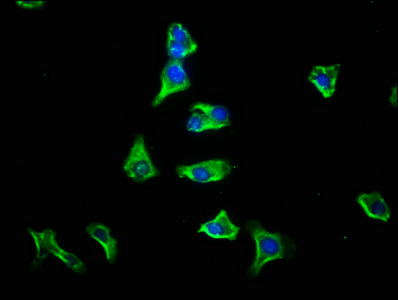Full Product Name
Rabbit anti-Homo sapiens (Human) GPSM1 Polyclonal antibody
Alternative Names
Activator of G-protein signaling 3 antibody; AGS3 antibody; AGS3 homolog antibody; C10a antibody; G protein signaling modulator 1 (AGS3 like; C. elegans) antibody; G-protein-signaling modulator 1 antibody; GPSM1 antibody; GPSM1_HUMAN antibody
Immunogen
Recombinant Human G-protein-signaling modulator 1 protein (60-300AA)
Immunogen Species
Homo sapiens (Human)
Conjugate
Non-conjugated
The GPSM1 Antibody (Product code: CSB-PA801266LA01HU) is Non-conjugated. For GPSM1 Antibody with conjugates, please check the following table.
Available Conjugates
| Conjugate |
Product Code |
Product Name |
Application |
| HRP |
CSB-PA801266LB01HU |
GPSM1 Antibody, HRP conjugated |
ELISA |
| FITC |
CSB-PA801266LC01HU |
GPSM1 Antibody, FITC conjugated |
|
| Biotin |
CSB-PA801266LD01HU |
GPSM1 Antibody, Biotin conjugated |
ELISA |
Purification Method
>95%, Protein G purified
Concentration
It differs from different batches. Please contact us to confirm it.
Buffer
Preservative: 0.03% Proclin 300
Constituents: 50% Glycerol, 0.01M PBS, PH 7.4
Tested Applications
ELISA, IF
Recommended Dilution
| Application |
Recommended Dilution |
| IF |
1:50-1:200 |
Storage
Upon receipt, store at -20°C or -80°C. Avoid repeated freeze.
Lead Time
Basically, we can dispatch the products out in 1-3 working days after receiving your orders. Delivery time maybe differs from different purchasing way or location, please kindly consult your local distributors for specific delivery time.
Usage
For Research Use Only. Not for use in diagnostic or therapeutic procedures.







